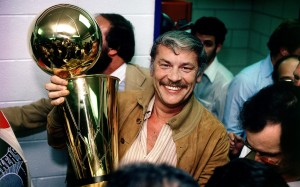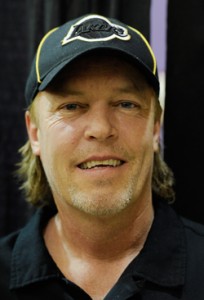 The All-Star break has come and gone, and the trade deadline is here. (We’ll get to that.)
The All-Star break has come and gone, and the trade deadline is here. (We’ll get to that.)
But the biggest story in California this week – the biggest in the NBA, really – came Monday with the death of Lakers owner Jerry Buss. It will have a serious impact on the league’s most important brand, so it makes sense to start there.
Mitch Kupchak signed with the Lakers in July 1981, after averaging 12.5 points and 6.9 rebounds a season earlier in Washington. He cost the Lakers Jim Chones, Brad Holland, a 1982 second-round pick and their first rounder in 1983. He posted 14.5 points and 8.1 rebounds in 26 games that season before tearing up his knee against the Clippers at the San Diego Sports Arena.
He was never the same as a player, but 32 years later he’s still serving the Lakers. All of it, until Monday morning, for Dr. Jerry Buss. The iconic Lakers owner died of kidney failure, a complication of the cancer forcing him into the hospital for most of the last 18 months.
“(Monday) was an empty day. I couldn’t seem to find a place where I was comfortable. A room, a place, a car, a house. A major loss personally, for obvious reasons,” Kupchak said Tuesday, meeting the media.
“The one thing, (Jerry) always came at a problem from a different space,” Kupchak said. “You could think that you had all the angles covered in an acquisition or a trade or a free agent or a problem, and you’ll sit down with him and out of the blue he’d come at you from a different angle. A very unique angle, and most of the time, the conversation that followed was productive. He would never say he was right all the time. But he had a unique way of looking at almost every problem that I was never able to precisely predict when I went in to meet with him.”
A transformative figure in NBA history, no owner in professional sports could match the
record and influence of Dr. Buss, who purchased the Lakers ahead of the 1979 season. The Lakers won 10 titles, were in the Finals nearly every other year, and – this part I find most amazing – missed the playoffs twice.
There were superstar players, superstar coaches and superstar management. The through-line, though, was always Dr. Buss. And though he hadn’t attended a game in two seasons and had stepped back from the day-to-day operations of the team for a few years, his presence was a comforting factor for Kupchak.
“Just knowing he was there was a good feeling to me, and he’s gone now,” he said.
Comforting to him, and to Lakers fans, who are yet to trust and embrace Jim Buss, now the man with ultimate authority on basketball decisions going forward for the NBA’s most iconic brand. Buss the Younger has his father’s sense of style – not exactly runway quality, with a seemingly endless supply of sneakers, blue jeans and baseball hats – but almost none of his presence and swagger. Only relatively recently has he started doing public interviews (in no small part because he’s not very good at them).
